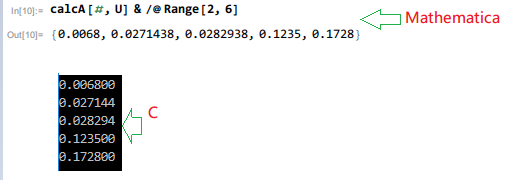ObiviouslyObviously, the above formula havehas relationship with four varibles \$u_i,\cdots u_{i+3}\$.
In the begining, I implement it in Wolfram MathematicaMathematica with the help of Compile[] technique and corresponding option like CompilationTarget -> "C". The screenshot as shown below:
#include <math.h>
#include <stdio.h>
//calc_A()
double calc_A(int i, const double *U) {
double u0, u1, u2, u3;
double res;
u0 = U[i];
u1 = U[i+1];
u2 = U[i+2];
u3 = U[i+3];
//implementation of the explicit formula
res = 3 * pow(u1, 4) + 3 * pow(u1, 3)*(u2 - 2 * u3) +
pow(u1, 2)*(3 * pow(u2, 2) - 7 * u2*u3 + 3 * pow(u3, 2)) +
u1*u2*(3 * pow(u2, 2) - 8 * u2*u3 + 4 * pow(u3, 2)) +
pow(u2, 2)*(3 * pow(u2, 2) - 9 * u2*u3 + 8 * pow(u3, 2)) +
pow(u0, 2)*(8 * pow(u1, 2) + 3 * pow(u2, 2) + 4 * u1*(u2 - 5 * u3) - 10 * u2*u3 +
15 * pow(u3, 2)) - u0*(9 * pow(u1, 3) + pow(u1, 2)*(8 * u2 - 19 * u3) +
u1*(7 * pow(u2, 2) - 22 * u2*u3 + 10 * pow(u3, 2)) +
u2*(6 * pow(u2, 2) - 19 * u2*u3 + 20 * pow(u3, 2)));
return res;
}
int main() {
double U[] = { 0., 0., 0., 0., 0.2, 0.25, 0.4, 0.6, 0.8, 1., 1., 1., 1. };
int i;
double res;
//calculate A[2]~A[6]
for (i = 2; i <= 6; i++) {
res = calc_A(i, U);
printf("%f\n", res);
}
system("pause");
return 0;
}
where, \$\mathbf U=\{u_0,\cdots,u_m\}\$
TEST

